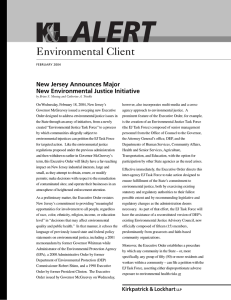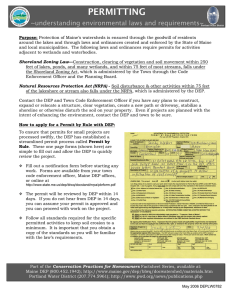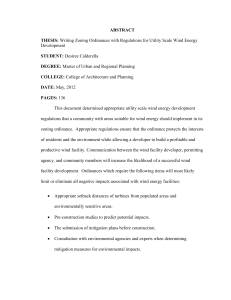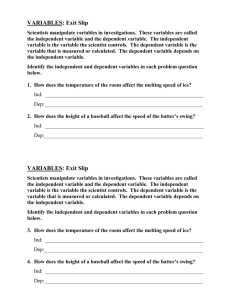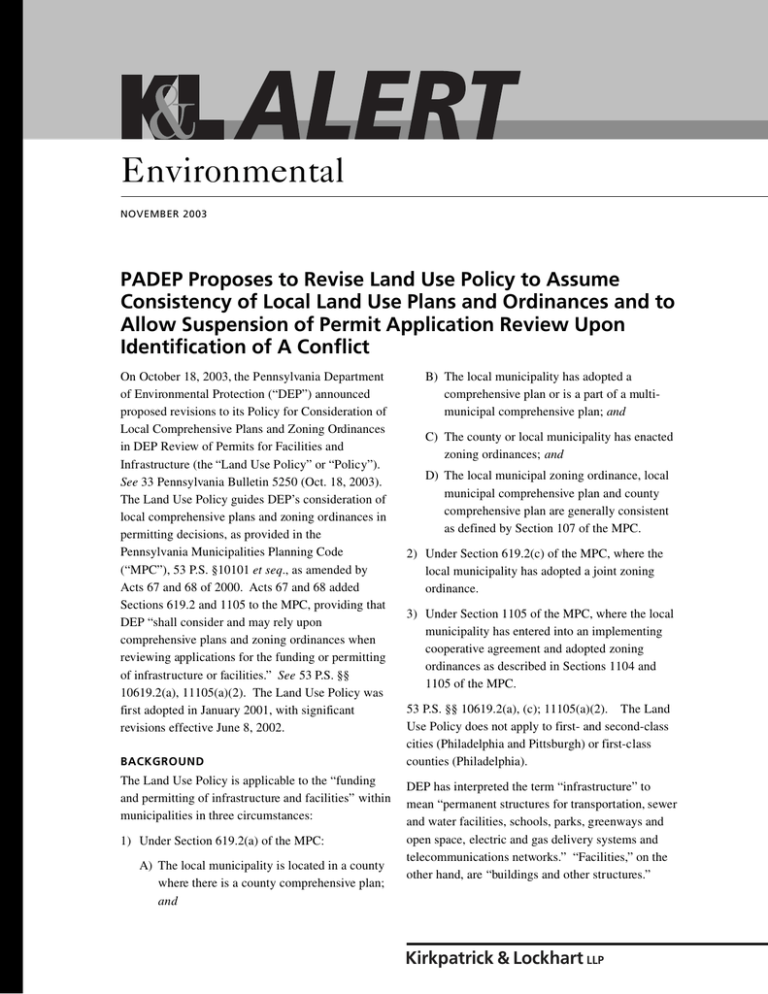
Environmental
NOVEMBER 2003
PADEP Proposes to Revise Land Use Policy to Assume
Consistency of Local Land Use Plans and Ordinances and to
Allow Suspension of Permit Application Review Upon
Identification of A Conflict
On October 18, 2003, the Pennsylvania Department
of Environmental Protection (“DEP”) announced
proposed revisions to its Policy for Consideration of
Local Comprehensive Plans and Zoning Ordinances
in DEP Review of Permits for Facilities and
Infrastructure (the “Land Use Policy” or “Policy”).
See 33 Pennsylvania Bulletin 5250 (Oct. 18, 2003).
The Land Use Policy guides DEP’s consideration of
local comprehensive plans and zoning ordinances in
permitting decisions, as provided in the
Pennsylvania Municipalities Planning Code
(“MPC”), 53 P.S. §10101 et seq., as amended by
Acts 67 and 68 of 2000. Acts 67 and 68 added
Sections 619.2 and 1105 to the MPC, providing that
DEP “shall consider and may rely upon
comprehensive plans and zoning ordinances when
reviewing applications for the funding or permitting
of infrastructure or facilities.” See 53 P.S. §§
10619.2(a), 11105(a)(2). The Land Use Policy was
first adopted in January 2001, with significant
revisions effective June 8, 2002.
BACKGROUND
The Land Use Policy is applicable to the “funding
and permitting of infrastructure and facilities” within
municipalities in three circumstances:
1) Under Section 619.2(a) of the MPC:
A) The local municipality is located in a county
where there is a county comprehensive plan;
and
B) The local municipality has adopted a
comprehensive plan or is a part of a multimunicipal comprehensive plan; and
C) The county or local municipality has enacted
zoning ordinances; and
D) The local municipal zoning ordinance, local
municipal comprehensive plan and county
comprehensive plan are generally consistent
as defined by Section 107 of the MPC.
2) Under Section 619.2(c) of the MPC, where the
local municipality has adopted a joint zoning
ordinance.
3) Under Section 1105 of the MPC, where the local
municipality has entered into an implementing
cooperative agreement and adopted zoning
ordinances as described in Sections 1104 and
1105 of the MPC.
53 P.S. §§ 10619.2(a), (c); 11105(a)(2). The Land
Use Policy does not apply to first- and second-class
cities (Philadelphia and Pittsburgh) or first-class
counties (Philadelphia).
DEP has interpreted the term “infrastructure” to
mean “permanent structures for transportation, sewer
and water facilities, schools, parks, greenways and
open space, electric and gas delivery systems and
telecommunications networks.” “Facilities,” on the
other hand, are “buildings and other structures.”
Kirkpatrick & Lockhart LLP
DEP has delineated which permits and
authorizations are subject to the Land Use Policy, in
Appendix A to the Policy. The Policy applies to
most significant permits and approvals granted by
DEP, including air quality plan approvals, NPDES
wastewater and stormwater discharge permits, earth
disturbance (erosion and sedimentation control)
permits, and water obstructions permits. The policy
does not cover activities that are authorized by
permit waivers or general permits.
DEP currently implements Acts 67 and 68 in a twostep process. First, DEP’s General Information
Form (“GIF”) (required for all applications to DEP)
contains several questions that determine whether
the land use review applies. Second, through
expanded Act 14 municipal notification letters that
are required as part of the permit application
process, municipalities and local governments are
notified of pending permit applications and given the
opportunity to comment on the consistency of the
proposed project with local land use ordinances and
plans. The Land Use Policy provides that any
comment raised by local governments will be
considered concurrently with the technical review of
the permit application.
PROPOSED AMENDMENTS
TO LAND USE POLICY
The proposed amendments to the Land Use Policy
(hereinafter “Proposed Policy”) include two
significant changes: (1) introducing an assumption
by DEP that local land use ordinances are “generally
consistent” with county, municipal or multimunicipal comprehensive plans, and (2) adopting a
policy allowing DEP to suspend review of a pending
application if a conflict with a local comprehensive
plan or zoning ordinance is identified.
First, as noted above, the land use review prescribed
by the MPC § 619.2 (a) and implemented by the
Land Use Policy applies only where the local
municipal zoning ordinance, local municipal
comprehensive plan and county comprehensive plan
are “generally consistent.” Policy at 10; see also 53
P.S. § 10603(j). The Proposed Policy contains this
new language: “[I]n order to determine if planning
and zoning are ‘generally consistent,’ DEP will
assume that the county comprehensive plan, the
municipal comprehensive plan and zoning
ordinances are all generally consistent.” Proposed
Policy at 11 (emphasis added). Although DEP
justifies the proposed amendment to the Policy
“because Section 301(a)(5) and Section 603(j) [of
the MPC] require general consistency,” this is not
necessarily the case in a number of Pennsylvania
municipalities. In certain locales, zoning
ordinances preceded the development of
comprehensive plans, and ordinances have not
necessarily been conformed to the subsequently
adopted plans. The assumption proposed by DEP
will expand the applicable scope of the Policy in
certain municipalities to cover facilities that are not
covered by MPC § 619.2(a). In effect, this may
require permit applicants to explain why the local
zoning ordinances and comprehensive plans are not
consistent, and why DEP should not rely upon them
in making a given permit decision. To the extent
that DEP relies on a comprehensive plan or zoning
ordinance in such a circumstance to render an
adverse permit decision, or to impose conditions on
approval, the applicant will need to seek review of
the “general consistency” issue before the
Environmental Hearing Board.
Second, DEP proposes to amend the Land Use
Policy to allow the Department to suspend review of
a pending application if a conflict with local
comprehensive plans or zoning ordinances is
identified. Specifically, the proposed change in the
Policy states: “Where a conflict has been identified,
DEP may suspend further review of the application
until the conflict has been resolved.” Proposed
Policy at 11. The Policy identifies when a
“potential” conflict arises:
A potential conflict arises when DEP staff
receives a response letter from the county or
local municipality indicating that the project
may conflict with comprehensive plans or zoning
ordinances or if the applicant submits information
on the GIF that indicates that there is such a
conflict.
Proposed Policy at 9 (emphasis added). The
proposed amendments to the Policy suggest that
DEP “may” suspend review of an application “on a
case-by-case basis,” based upon a determination by
the Regional Director. The Policy does not,
however, provide guidelines or other criteria that
KIRKPATRICK & LOCKHART LLP ENVIRONMENTAL ALERT
OPPORTUNITY FOR COMMENT
DEP will use to determine if a true conflict exists
and, if a conflict exists, whether suspension is
warranted.
According to the proposed amendments, a
suspension will be effective “until the conflict has
been resolved.” Significantly, the amendments to the
Policy do not establish a time limit for the
suspension, and toward that end exempt the permit
application from the Department’s Money-Back
Guarantee Program (the program in which DEP
refunds the applicant’s permit fee if an answer from
DEP on the application is not provided within
certain time limitations). This may result in
protracted delays of permitting decisions, and
potentially greater involvement by DEP in disputes
regarding local land use approvals. Given that
suspension may occur on a case-by-case basis, and may
extend permit lead times indefinitely, many permit
applicants will find new value in the “Early Opt-out
Option,” whereby applicants seek and submit
municipal and county approval letters with the
application package. See Proposed Policy at 8–9.
FOR MORE INFORMATION about this Alert or Kirkpatrick &
Lockhart’s environmental practice, please contact the authors or
one of the K&L office contacts below. You may also visit our
website at www.kl.com.
Roger C. Zehntner
Robert Everett Wolin
R. Timothy Weston
Frederick J. Ufkes
Daniel A. Casey
William H. Hyatt, Jr.
Warren H. Colodner
Richard W. Hosking
Edward P. Sangster
Barry M. Hartman
Boston
Dallas
Harrisburg
Los Angeles
Miami
Newark
New York
Pittsburgh
San Francisco
Washington
617.261.3149
214.939.4909
717.231.4504
310.552.5079
305.539.3324
973.848.4045
212.536.3912
412.355.8612
415.249.1028
202.778.9338
Those seeking permits from DEP that are the subject
of land use review should be aware of this proposed
change in policy, and, if so inclined, may submit
comments to the Department during the public
comment period. The comment period will run from
October 18 – November 18, 2003.
The Land Use Policy, including the proposed
amendments, is available on DEP’s website at:
http://www.dep.state.pa.us/TechnicalGuidance/
Draft_technical_guidance.asp.
■ ■ ■
Kirkpatrick & Lockhart LLP’s Pennsylvania offices
(located in Pittsburgh and Harrisburg) have
significant environmental and land use practices that
are able to assist clients in the complex regulatory
field of environmental and land use regulation.
K&L’s Environmental and Natural Resources
practice group includes over sixty attorneys, who
deal regularly with every major federal
environmental statute and regulatory program and
the corollary Pennsylvania programs. K&L’s Land
Use and Planning practitioners provide legal advice
to a wide variety of clients in the areas of land use,
planning, and zoning law throughout Pennsylvania
rzehntner@kl.com
rwolin@kl.com
tweston@kl.com
fufkes@kl.com
dcasey@kl.com
whyatt@kl.com
wcolodner@kl.com
rhosking@kl.com
esangster@kl.com
bhartman@kl.com
CRAIG P. WILSON
717.231.4509
cwilson@kl.com
TIFFANY M. CARTWRIGHT
717.231.4524
tcartwright@kl.com
®
Kirkpatrick & Lockhart LLP
Challenge us. ®
www.kl.com
BOSTON
■
DALLAS
■
HARRISBURG
■
LOS ANGELES
■
MIAMI
■
NEWARK
■
NEW YORK
■
PITTSBURGH
■
SAN FRANCISCO
■
WASHINGTON
.........................................................................................................................................................
This publication/newsletter is for informational purposes and does not contain or convey legal advice. The information herein
should not be used or relied upon in regard to any particular facts or circumstances without first consulting a lawyer.
NOVEMBER 2003
LLP. ALL RIGHTS RESERVED.
© 2003 KIRKPATRICK & LOCKHART
Kirkpatrick
& Lockhart LLP
75 State Street
Boston, Massachusetts 02109
617.261.3100 PHONE
617.261.3175 FAX
2828 North Harwood Street
Suite 1800
Dallas, Texas 75201
214.939.4900 PHONE
214.939.4949 FAX
Payne Shoemaker Building
240 North Third Street
Harrisburg, Pennsylvania 17101
717.231.4500 PHONE
717.231.4501 FAX
10100 Santa Monica Boulevard
Seventh Floor
Los Angeles, California 90067
310.552.5000 PHONE
310.552.5001 FAX
Miami Center - 20th Floor
201 South Biscayne Boulevard
Miami, Florida 33131
305.539.3300 PHONE
305.358.7095 FAX
One Newark Center, 10th Floor
Newark, New Jersey 07102
973.848.4000 PHONE
973.848.4001 FAX
599 Lexington Avenue
New York, New York 10022
212.536.3900 PHONE
212.536.3901 FAX
Henry W. Oliver Building
535 Smithfield Street
Pittsburgh, Pennsylvania 15222
412.355.6500 PHONE
412.355.6501 FAX
Four Embarcadero Center, 10th Floor
San Francisco, California 94111
415.249.1000 PHONE
415.249.1001 FAX
1800 Massachusetts Avenue, N.W.
Second Floor
Washington, DC 20036
202.778.9000 PHONE
202.778.9100 FAX
®
www.kl.com
Kirkpatrick & Lockhart LLP
Challenge us.
®

